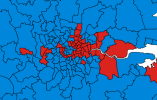Philip
On Moderation
What are the possible reasons for Birmingham and the more 'working class' areas of London not being old school staunch Labour vote areas, unlike similar industrial and working class areas in the North?
I know London has become left wing in recent years, but this is a more modern and liberel branch of the left, helped a lot by the diversity of London. It isn't really 'Labour' in the same way South/West Yorkshire, parts of Lancashire & Greater Manchester, Liverpool and the North East are; yet in the 2005 GE the Tories did well in many areas of London, even some of the more working class areas, but at the time the areas of the North mentioned above were safe Labour seats.
Birmingham & the West Midlands area has a heavy industrial past like much of the North, but unlike these northern areas it isn't staunch Labour and hasn't been for a long time as far as I know. Places like Kidderminster, South Wolverhampton, Stourbridge etc are not especially wealthy areas but these are middle ground seats targeted by the Tories at each election.
Is the traditional Labour vote influenced to an extent by whether or not the constituency is in the North, South, or in the Midlands?
I know London has become left wing in recent years, but this is a more modern and liberel branch of the left, helped a lot by the diversity of London. It isn't really 'Labour' in the same way South/West Yorkshire, parts of Lancashire & Greater Manchester, Liverpool and the North East are; yet in the 2005 GE the Tories did well in many areas of London, even some of the more working class areas, but at the time the areas of the North mentioned above were safe Labour seats.
Birmingham & the West Midlands area has a heavy industrial past like much of the North, but unlike these northern areas it isn't staunch Labour and hasn't been for a long time as far as I know. Places like Kidderminster, South Wolverhampton, Stourbridge etc are not especially wealthy areas but these are middle ground seats targeted by the Tories at each election.
Is the traditional Labour vote influenced to an extent by whether or not the constituency is in the North, South, or in the Midlands?

